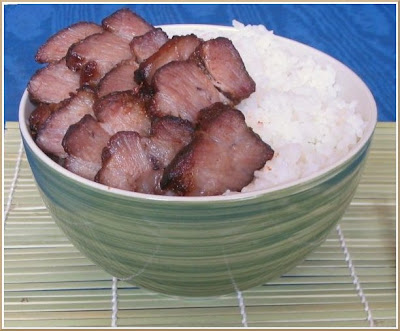
Take a stroll down a street in Chinatown and you’ll often see roast duck and char siu hanging in a store or restaurant window. Char siu, or cha shao, literally translates into “fork roasted” because the meat is suspended from hooks while being roasted in the oven. The most distinguishing feature of char siu is its color. While it is usually a dark red, it can range from a barely-red dark brown to a strange pink. The problem with some char siu is that while the color is attractive and smell tantalizing, more often then not, the meat inside is a bland white, that’s dry and difficult to swallow.
I have made many attempts to try to make char siu at home but homemade char siu is plagued with different problems. The meat is juicy but the taste is nowhere close. In addition, without using red food coloring you can’t achieve the deep red color. Overall the meat tastes decent but it does not look like or taste like true char siu. With each attempt, something was still off and I was close to giving up entirely. Steven told me to “just use the stuff in the packet” like his mom. I’ve tried the char siu his mom made from the packet, it wasn’t bad, don’t get me wrong, but I am vehemently opposed to using any sort of seasoning packet. Then Cook’s Illustrated published their version of the recipe. I was extremely eager to try it. You may notice that many of my recipes are adaptations from Cook’s Illustrated recipes because their recipes are usually really great. Their very scientific methodology of testing a recipe’s multiple variations and permutations really speaks to my inner scientist (though their recipes can end up being a bit labor intensive and over-the-top). On the other hand, I was a tad skeptical because how can their recipe be better than the ones in Chinese dim sum books I’ve looked at in the past. Shouldn’t the recipe in those books be more “authentic”?
All doubts were erased when I tasted the final product, lightly charred on the outside and tender and juicy on the inside. It was fantastic! The flavor was really close (I can’t say it was spot on because I couldn’t do a side by side comparison), but the meat was so flavorful inside and out, I daresay this recipe is better! The recipe did not use food coloring but a deep mahogany reddish brown was achieved by using ketchup. Sure it’s not an authentic ingredient but that’s a minor detail since it tastes so darn good!
The recipe called for pork butt, a cut from the shoulder, but I used country style ribs instead, which worked wonderfully. I also changed a few of the ingredients, for example decreasing the hoisin sauce because I don't like a strong hoisin flavor. Since the recipe calls for around 4 lbs of meat, the original plan was to make some cha shao bao but the meat mysteriously disappeared so quickly that there was hardly any left to make bao. Next time I make this, I promise I’ll have a recipe for cha shao bao.
Char Siu – Chinese BBQ Pork
Adapted from Cook’s Illustrated
4 lbs pork boneless butt cut into slices about 1-in thick, or country style ribs
Marinade
1/4 C sugar
1/2 C soy sauce
1/4 C hoisin sauce
1/4 C Shao Hsing rice wine, or dry sherry
1/4 tsp white pepper
1 tsp five spice powder
2 tsp toasted sesame oil
1 Tbsp freshly grated ginger
2 garlic cloves, minced
Basting
1/4 C ketchup
1/4 C honey
You will need an oven-safe wire rack and tray for this recipe.
Whisk together all the ingredients for the marinade in a bowl. Add the sesame oil, after you whisk everything together, otherwise the oil combines with the five spice and forms clumps that are hard to incorporate. Measure out 1/3 C of the marinade and set aside.
Pierce the pieces of pork 10 – 12 times all over with a fork. Place in a large zipper lock bag or tray and pour the marinade over the pork. Make sure each piece of pork is coated sufficiently with the marinade. Marinate in the fridge for 3 – 5 hours.
For the glaze, combine the reserved 1/3 C of marinade with the ketchup and honey. Cook over medium heat and reduce it until it’s syrupy, about 4 – 6 minutes.
Preheat the oven to 300ºF. Line a tray with foil and set the wire rack over the tray.
Place the pork on the wire rack. Pour about 1/2 C (enough to cover the bottom) of hot water into the bottom of the tray and cover the tray tightly with foil. Roast on the middle rack for 20 minutes.
Remove the foil and roast for another 40 to 45 minutes, until the edges of the meat start to brown.
Turn on the broiler (keeping the rack on the middle rack), and broil the first side of the pork for about 5 minutes. Then brush the pork with half the glaze and broil for another 5 minutes, until the pork is a dark brownish red and evenly caramelized. Flip the meat over and broil the second side for 5 minutes, then brush on the glaze, and broil for another 5 minutes.
Cool, then cut into slices and serve with rice. If you have extra, you can freeze it, add it to soup, ramen, or fried rice.